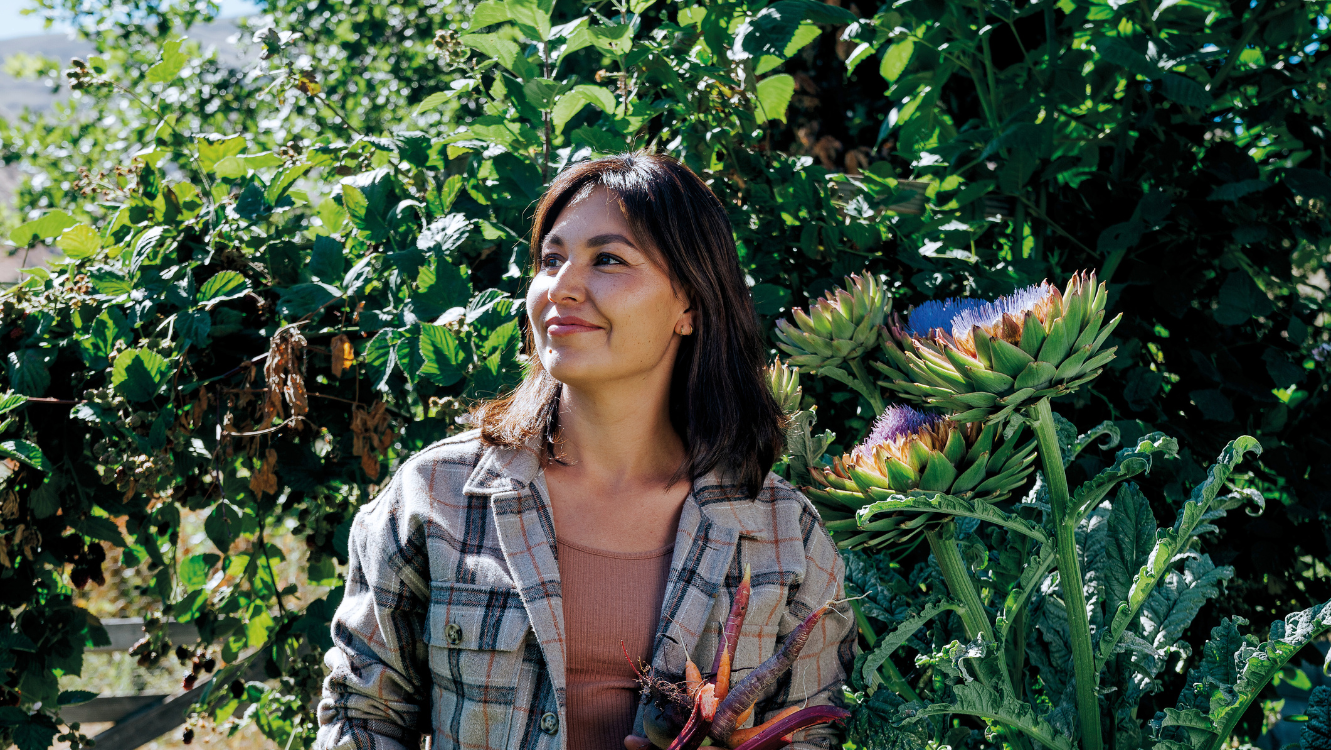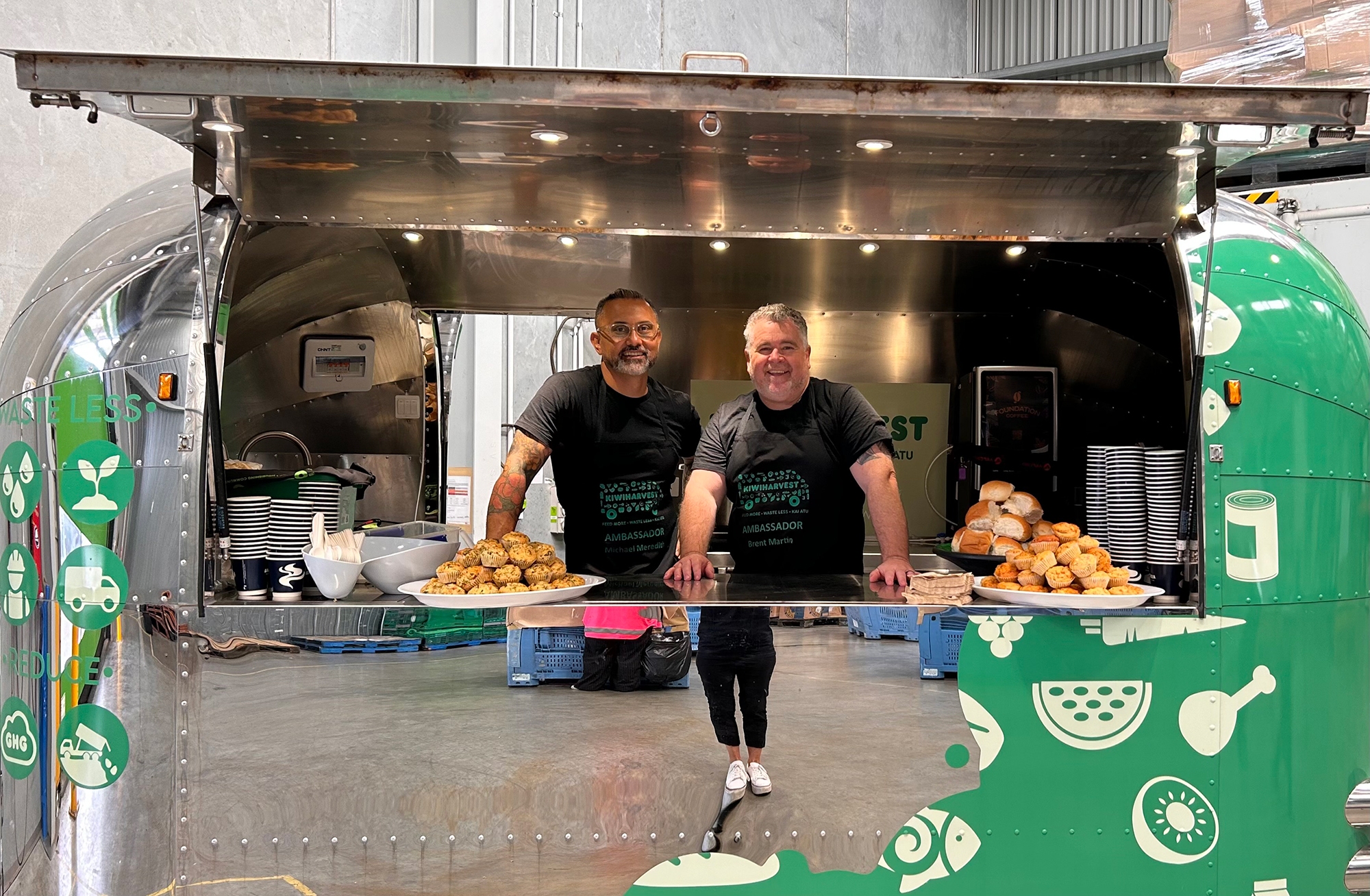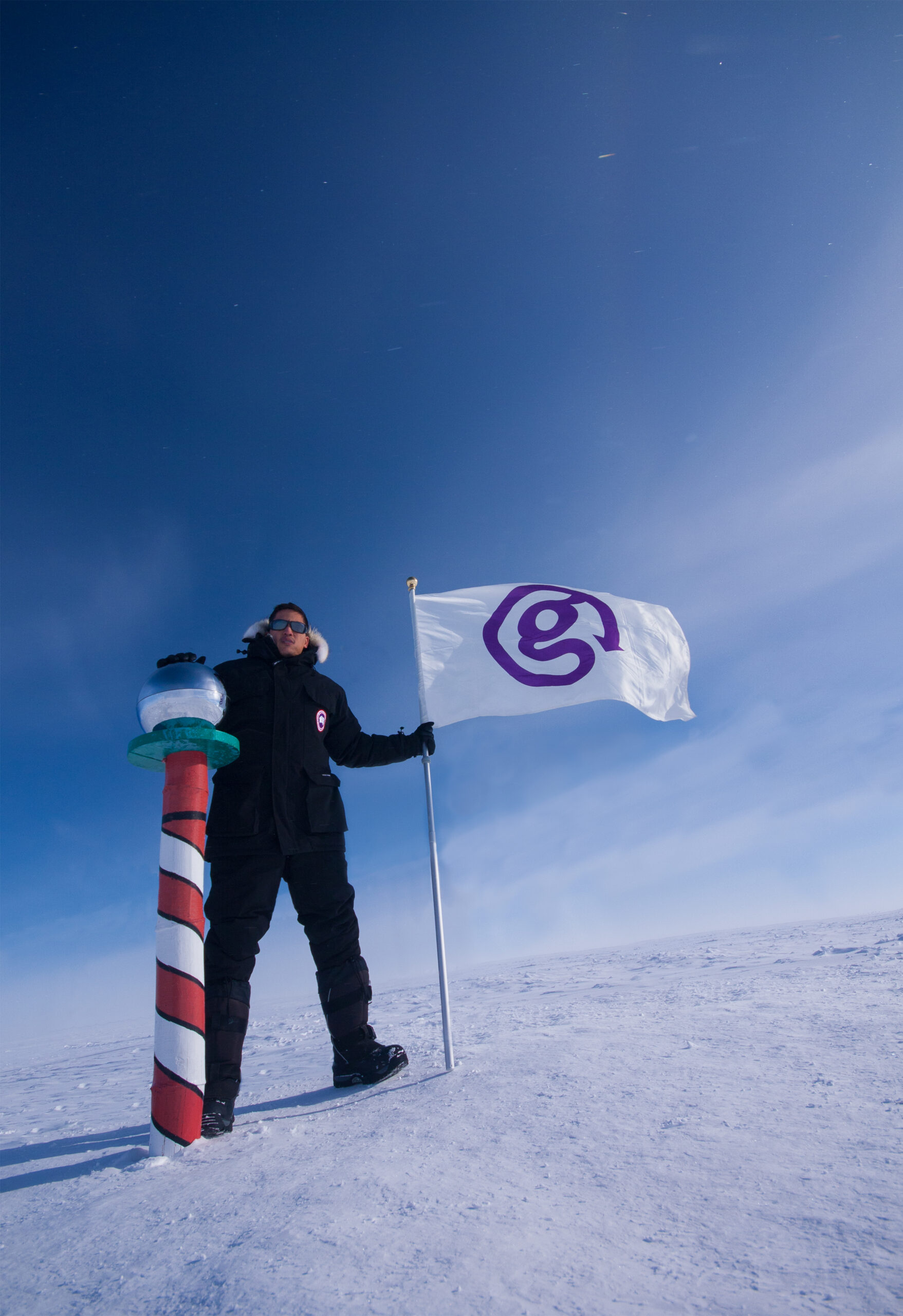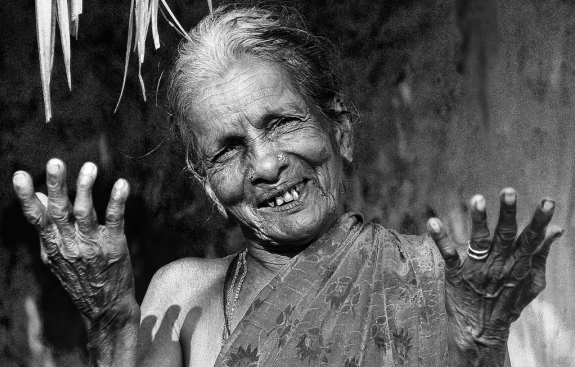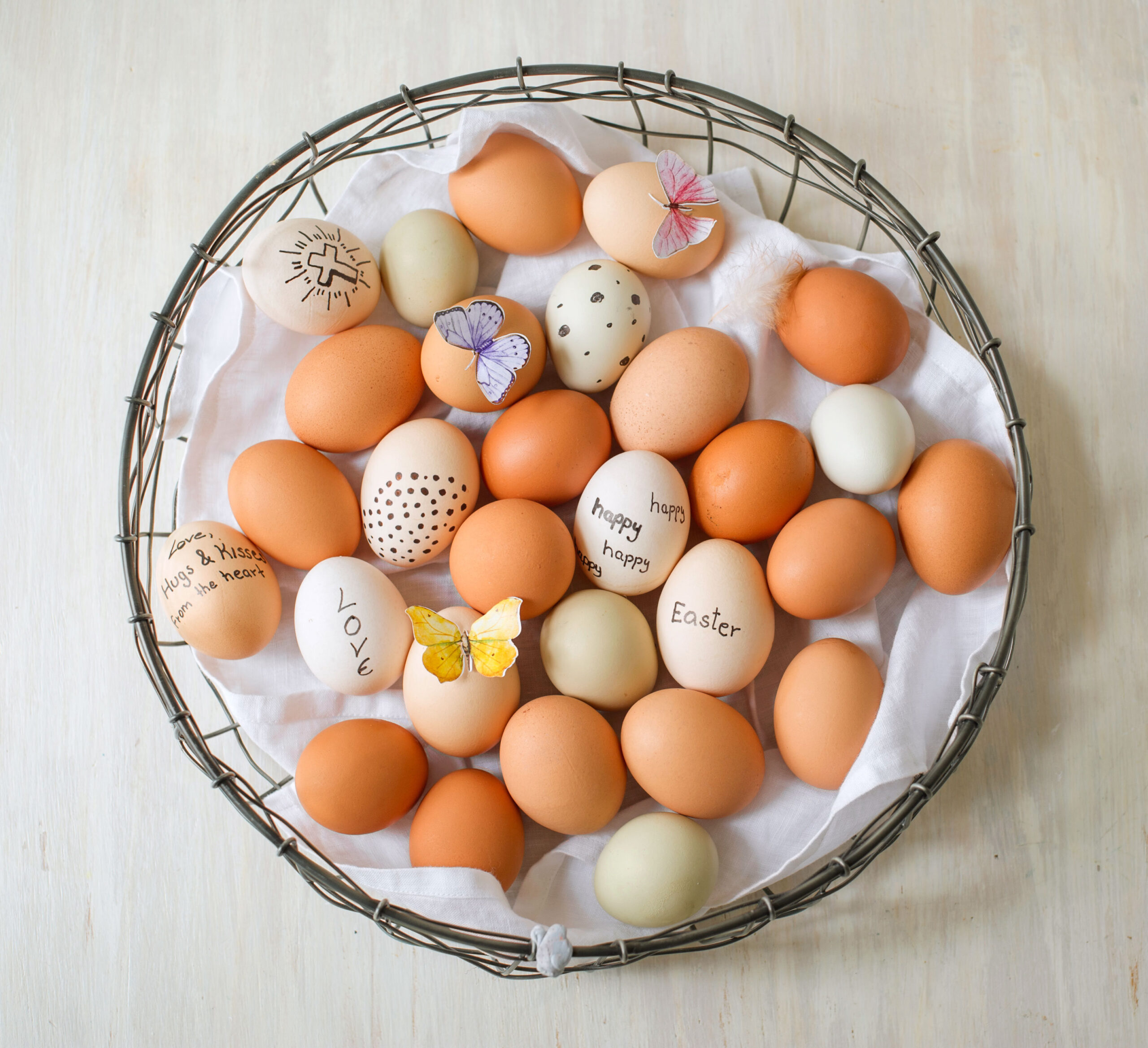Words: Carolyn Enting, Photography: Penny Kingan and Sam Stewart
Allowing others to follow their dreams is one of the greatest gifts you can give someone including your life partner, which is why Nadia Lim is currently flying solo while her hubby and wingman Carlos Bagrie is off on an educational adventure of a lifetime.
In March, Carlos left on a jet plane to South America leaving Nadia in charge of the couple’s 1200-acre Royalburn Station – best known to television viewers as Nadia’s Farm – near Arrowtown and she’s fully supportive.
Having been awarded a Nuffield Farming Scholarship Carlos is travelling the world for six months to investigate and learn as much as he can about regenerative farming practices and circular farming solutions to bring back home.
“When I won MasterChef he gave up his job to help me try and achieve my dream so my thought process is I owe him the same back,” she says. “It’s an incredible opportunity and they don’t come along like this very often so when one does, it’s good to take it.”
Though she acknowledges things will be more hectic on the home front, particularly with three boys under seven and a working farm to attend to, she is pragmatic about it and knows from recent experience that sometimes if you let something go, it will flourish.
That’s what happened in her formerly well-tended vegetable garden and greenhouse when a spinal injury from a freak skiing accident as well as a new baby forced her to up tools and rest.
The garden beds self-seeded, blooming into a beautiful tangle of edible plants and vegetables with enough produce to feed the family with lots to spare.
At the outset of what would turn out to be a gorgeous garden experiment, she was on doctor’s orders not to do any lifting or anything that would slow her healing.
“I’d just had a baby, then fractured my spine and I didn’t have the capacity or resource to have a perfect garden or control what I was going to grow. I decided to just let it go and see what came out of it,” she explains. “Aside from some pumpkin seedlings which I transplanted from the compost, planting a few courgette and brassica seedlings and sowing beetroot and carrot seed, it’s come up by itself. It’s all wild and tangly and everything’s integrated with each other, it’s just so beautiful.”
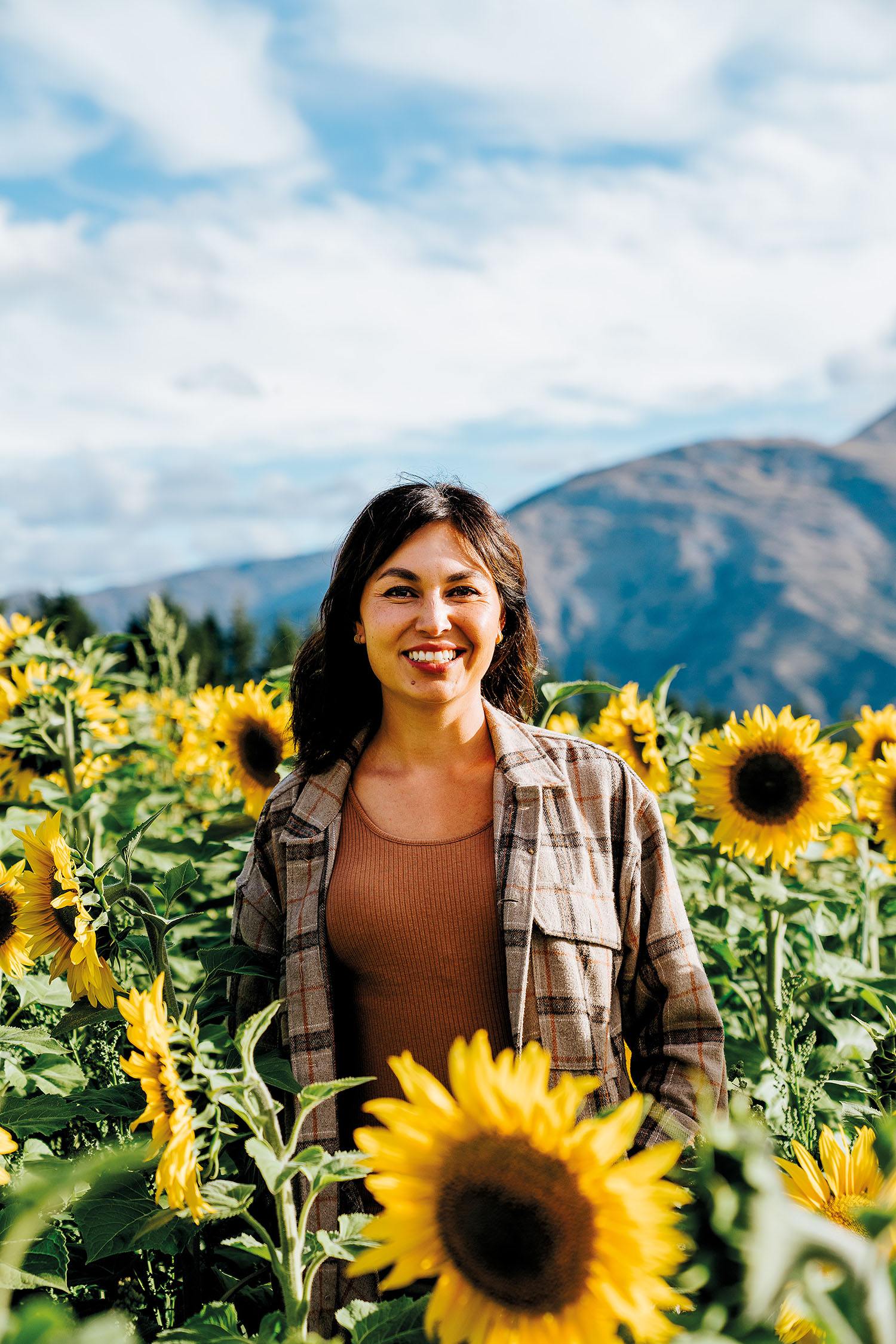
Health First
Nadia’s skiing accident happened six months after giving birth to her third child, Arlo, 12 months, and she’s grateful it wasn’t worse. During recovery all she could do was walk slowly, and rest, and she didn’t fight it.
“I acknowledged that my body needed to rest and that was the most important thing, not to push it. It really pays dividends if you don’t push it past its limits,” she says.
“I’ve always been good at monitoring what my body needs and looked at it as a best mate. Even when I was really young, I always tried to be very grateful to my body and treat it well.”
During her recovery while she was having osteo and acupuncture treatments the feedback from all was that her body recovers incredibly well, an affirmation that she is doing something right.
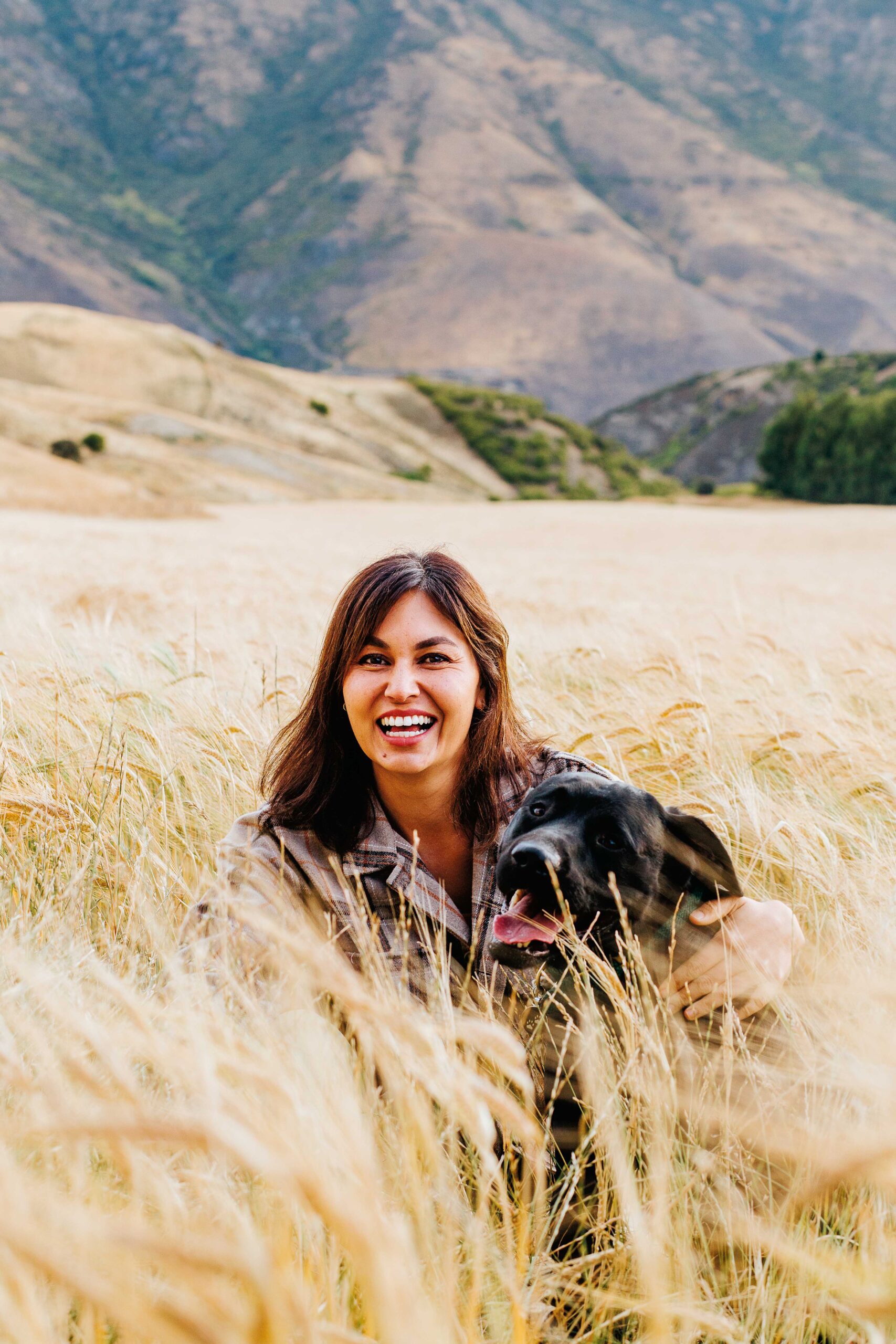
Getting Back To Basics
Her formula for good health is what she calls the “boring basics” – good sleep, good food, strong connections with family and friends, spending time outside, not taking yourself too seriously and dancing. As she reels off the list, she dances around the room with baby Arlo in her arms.
“Music is such an incredible tool to be able to express at the time what your feelings are and if it gets you dancing, then great. You can be dancing by yourself in the kitchen while you’re making a meal,” she laughs. “I think the boring basics are the key to health and happiness. Don’t overcomplicate things. So many things in life these days are way too over complicated.”
She questions our obsession with finding balance because what does that mean? 50-50? “Nothing’s ever 50-50, it’s always changing so I think you just have to integrate things and go with the flow.”
Nadia integrates mindful micro moments and subconscious rituals into her day rather than aiming to take 20 minutes to meditate and then failing.
“If you can incorporate moments into everyday life then it becomes so much more sustainable, manageable, accessible and practical and that’s what people need,” she says.
When she wakes, she lies in bed and listens to the birds, the wind and sounds of the farm, which is a form of meditation – unless Arlo is screaming to get up of course!
“There’s no way I could find time to meditate for a solid 20 minutes, but I actually achieve that by having micro moments throughout the day,” she explains. “Starting with a few minutes in the morning lying in bed, having really nice breaths and just being very conscious and listening.”
Other micro moments might be 10 minutes to herself in the bathroom or having a cup of tea. She also doesn’t follow a regular exercise regime because that doesn’t work for her.
“I think rest is really important for your body and not putting it under too much stress or strain. It seems to be to a lot of people that extreme exercise is healthy. Maybe some people’s bodies respond well to it but mine doesn’t,” she says.
“I’m not a gym person but I do see the value of going for a nice walk and I try to incorporate that into my lifestyle. To me that is good because it’s not just physical exercise, it’s also getting vitamin D, and breathing fresh mountain air. It’s good for the senses and if I’m going for a walk with Carlos we get to catch up. All those things added up are great for your mental health.”
Nadia is also a huge fan of belly breathing, a skill she learned early on in her youth when she was a competitive swimmer. Since then, breathwork is something she has been very conscious of and it has become a health-giving micro moment tool where she just pauses to take a few big deep breaths.
“Your breath and how you breathe is everything because it communicates to the rest of your body what state you are in. If you’re stressed breathwork can convince your body and therefore your mind, that you are calm and that is going to cause a ripple effect.”
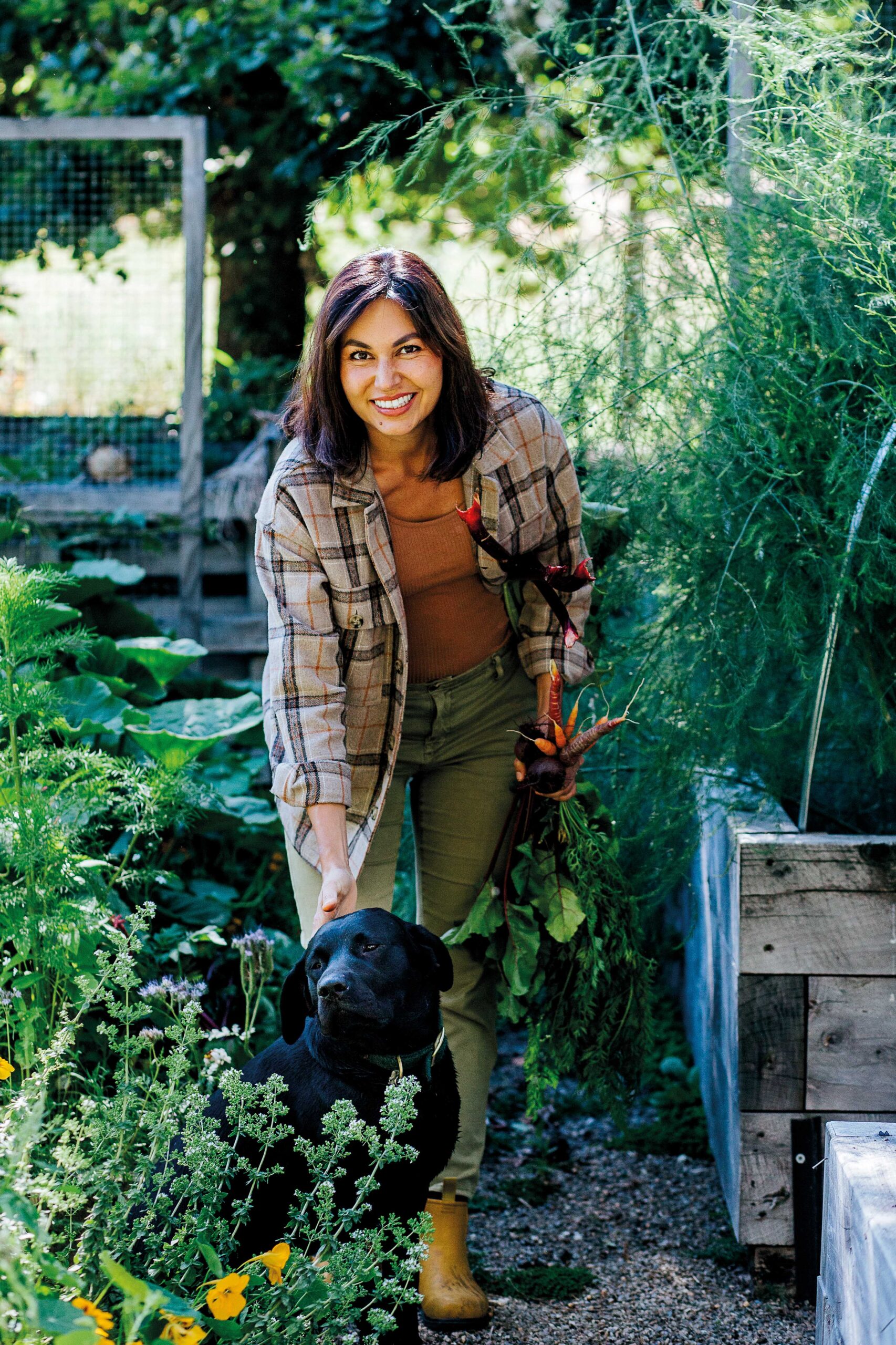
New Perspectives
One realisation that she relishes since she and Carlos’ big move south from Auckland to Central Otago four and a half years ago is that being a mum and life on a farm has changed her perspective of success.
“A common measure of success is how well you are doing financially or how much you are achieving but that’s not the best measure of success really.
“A much better measure of success is health, happiness and your time. Am I still ambitious? I still have big goals and want to do a lot of things but I value my time more,” she explains.
“Also, when you move from somewhere like the city to here on the farm your perspective on things also changes a bit. When you’re in amongst these majestic mountains you feel small and somewhat insignificant, which I think is good. You realise you’re really just a tiny, tiny part of this Earth. If you place too much importance or significance on yourself, life seems overwhelming. And that’s a really healthy perspective in terms of life and death and that you’re just quite insignificant on this Earth, and that there are a lot of things you can’t control. That’s probably the number one lesson in farming and living off the land. Don’t even try to control everything. You have to be comfortable with it, and I’ve learned there’s real beauty in that.
“It’s always different every season. You can have all these perfect plans and expect them to go according to that plan, but it never does. I think that’s actually really nice and maybe in a mental health sense that’s an important life lesson. Nowadays the modern world is a very controlled environment. People expect that and think that that’s how things work, but they don’t in the natural world.”
A large maple tree in the backyard is home to a fabulous treehouse for the boys Bodhi, seven, and River, five, and is also a clock that helps them tell the seasons.
“The kids have grown up knowing when their birthday month is by looking at that tree,” Nadia explains.
“Bodhi was born around the autumn equinox when the leaves are red, brown and orange. River is the spring equinox when the buds on the tree are tiny. Carlos is the winter solstice when the tree is completely bare and there’s snow on the ground. I’m the summer solstice when the leaves are bright green, and Arlo’s birthday is just after Valentine’s Day when it’s in full flower.”
Regenerative approach
The health of everything on the farm – soil, crops, chickens, animals, environment and people – is also of upmost priority for Nadia and Carlos, who have come to realise that one doesn’t thrive without assistance from the other.
Since taking on the former conventional sheep and barley farm in 2017 they have saved 1200 acres of fertile land from being turned into a subdivision, which is what it was earmarked for when they bought it.
Surrounded by mountains with a distant view of Lake Wakatipu and Russell Coutt’s golf course as a neighbouring property, you can see the appeal.
Instead, Royalburn is now probably one of New Zealand’s most diverse farms that is focused on regenerative farming while producing roughly enough food to feed 20,000 people. The Royalburn farm shop in Arrowtown supplies fresh free-range eggs, vegetables and sunflower oil from the farm, as well as the farm’s award-winning lamb. The couple grow oats for Otis Oat Milk, wheat for milling, clover and peas for seed and barley for their own beer. They also have beehives, and approximately 6000 free-ranging chickens who must be the happiest chickens in Aotearoa.
Wool grown on the farm is woven into beautiful blankets and strong wool used for eco-friendly planters that are kind to both plant and soil.
The couple have also just opened up Royalburn for weddings and events, and Carlos has been brewing beer with farm produce sales manager OIi Boyes which has resulted in a collaboration with leading Wellington craft beer producers Garage Project to produce “Swifty”, a great tasting session beer named after the Swiftburn River which runs through the station and has a play on the phrase “have a swifty”.
Gut Health Connection
Early on Nadia, whose science background is in nutrition and dietetics, drew parallels between human gut health and soil health on the farm.
She shared her insights with Carlos, who knew the practical side of farming having grown up on a farm. Together they make a great team figuring out the best ways to look after the soil and nutrient exchange required between plants and soil microbes.
“If you look after the soil and the microbiology within the soil just like you look after your gut microbiome, that’s how the human body can flourish and that’s how the land can flourish,” explains Nadia. “And then it rolls over into the stock as well because it’s all about how your nutrients are absorbed and exchanged and that’s what happens underneath all those networks in the soil. They live in harmony and symbiosis. If you don’t have the microbiology, your plants aren’t going to thrive because they’re not going to get all the nutrient exchange that they require, the help from the microbes. It’s the same as in your gut. They help break everything down and allow you to absorb the nutrients. So that to me is what a big part of regenerative farming is about.”
Carlos is big on crop rotation and once food for animals or humans is planted in the ground, it’s spray-free. Every year Carlos plants sunflowers on a different part of the farm. If they happen to be in a roadside paddock the flowers will attract daily visitors in the form of tourists climbing over the fence and more often than you’d think stripping off their clothes to have photos amongst the flowers!
Nude escapades aside, sunflowers are fabulous for soil health. Whilst the seeds are being harvested with the combine harvester, the heads and stalks are being chopped up and left on the ground as a carbon-rich mulch which protects and feeds the soil and microbes. The long taproots also help break up compacted ground.
Nadia’s Farm
If you watch the second season of Nadia’s Farm – available to watch on THREE NOW – expect to see sunflowers and more life on the farm.
The couple agreed to do a second season after the first was well received and people genuinely found it interesting, useful and educational which was always their goal. They want to show the real ins and outs of farming and not to sugar-coat it in any way in the hope that it clears up some of the misinformation and misunderstanding between rural and urban audiences.
“It can be very frustrating, the misconceptions involved when a lot of farmers get the finger pointed at them when they are genuinely doing good work,” says Nadia.
Happy Place
Harvesting herbs and vegetables from her garden and greenhouse is her happy place. It’s a favourite time of day when she gets to have some alone time.
During our catch-up courgettes were in abundance though annoyingly the boys are not fans. Nadia was sneaking courgette into their smoothies but they caught on fast, though she still grates it and other nutritious veggies into some of their favourite dishes like lasagne.
Butter rabbit is another family favourite though Carlos has done such a good job of irradicating rabbits on the farm and Winston, their black lab also loves chasing them, so they haven’t had it much of late.
“When we first moved here you could get a rabbit really easily. Carlos just had to point his gun out of the dining room window and that was dinner. It was way quicker than going to the supermarket or even our own farm butchery.”
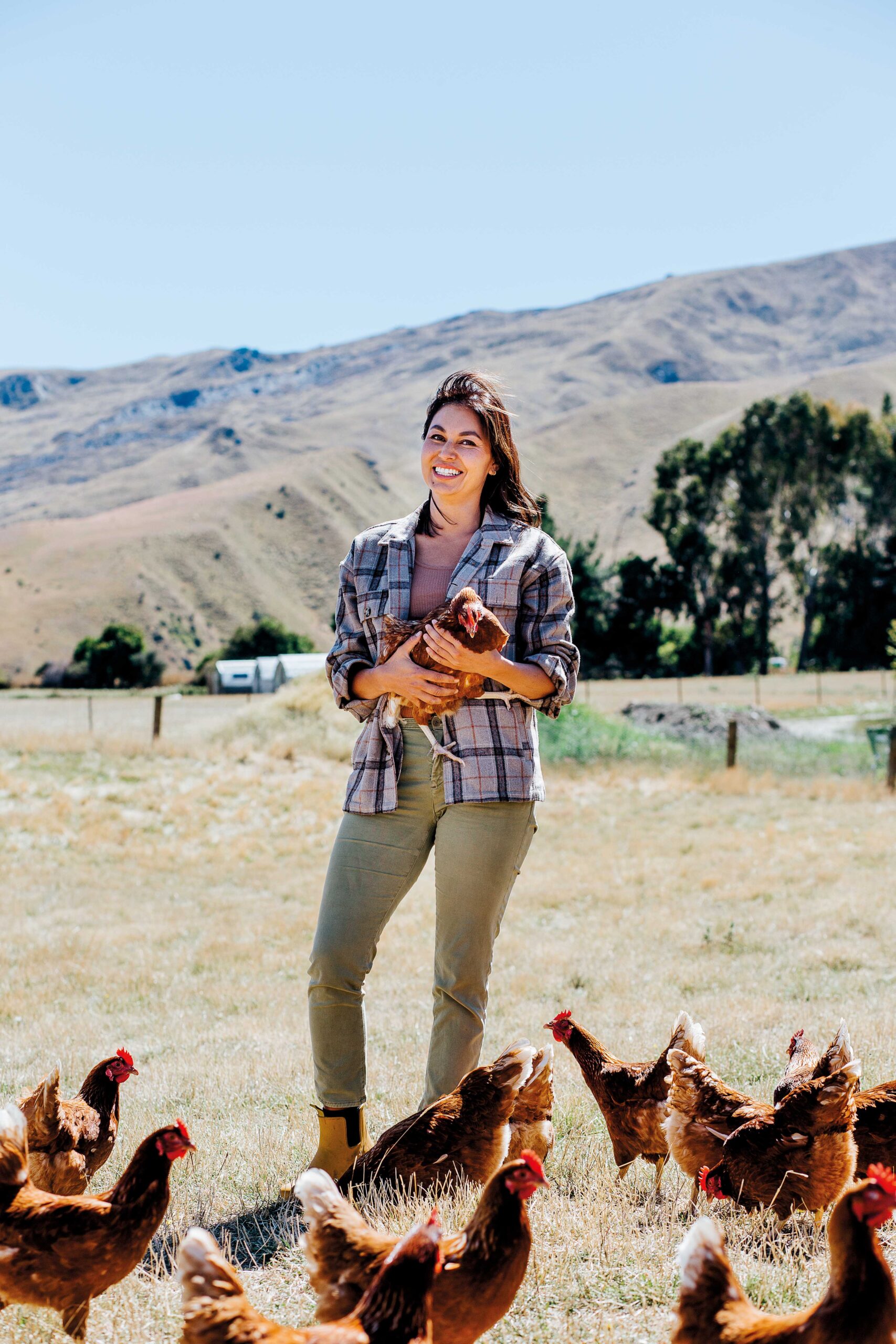
Retrospection
Does she wonder what she would be doing now if she hadn’t won MasterChef 13 years ago? She was a dietitian at the time, but she doesn’t think she would have continued down that path.
“I know I would have done something entrepreneurial because I always knew what I wanted to do from when I was 12. My dream was always to be like Jamie Oliver, to write cookbooks and have a cooking show on TV so I think I would have always kind of worked towards that, but I have no idea what pathway I would have taken to get there, but I feel like maybe I would have gotten there some other way.”
Since that time she has appeared on countless magazine covers, including her own journal, starting with Remix magazine after winning MasterChef and wearing a sparkly sequin dress. These days she’s more likely to be pictured holding a chicken.
She has also learned to be more resilient. Back during the MasterChef days online trolls, and particularly one troll could make her cry. Years later this person, who had changed her name when she married, applied for a job at My Food Bag three times and after repeatedly rejecting her CV Nadia decided everyone deserves a second chance and hired her. It turned out the person was passionate about cooking, ended up being an excellent employee and stayed with the company for four years.
Nadia counts herself lucky to have had a mostly positive experience with fans though she doesn’t think of herself as a celebrity. “I love having chats with people and I don’t feel like a celebrity. I don’t think people think of me that way as I’m not a glamorous actress or anything.”
Going Solo
For the next six months Nadia is looking forward to spending more time with her mum and sister, who are moving permanently into the area. “It will be awesome having family down here. We haven’t had that the whole time and it has been hard. I take my hat off to parents who don’t have any family close by.”
And while she does plan to ski again, she is going to skip this season, and instead use the time the boys are up the mountain for some peace and quiet time at home.
She is also relishing being able to spend time in the garden again and feels grateful that she has the opportunity to grow her own food. In her ideal world everyone could grow and raise their own food but she realises that is not practical.
“I’m an old soul. I should have been born 100 years ago. I would absolutely love to return back to those days, but I know that it’s not going to happen unless we form a commune!”
Click here for Nadia’s delicous recipe for Parsnip, Pear, Ginger And Walnut Cake With Caramel Cream Cheese Icing.


